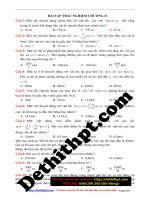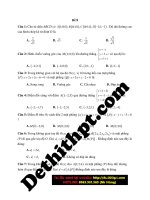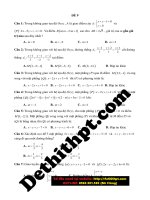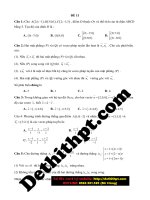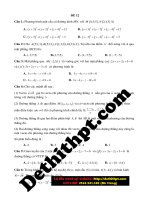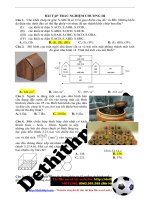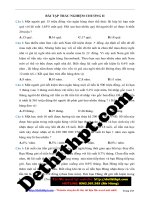Đề 31 image marked image marked
Bạn đang xem bản rút gọn của tài liệu. Xem và tải ngay bản đầy đủ của tài liệu tại đây (1.78 MB, 8 trang )
Exercise 31:
Read the following passage and mark the letter A, B, C or D to indicate the correct answer to each
of the questions.
There are three valid arguments to support the preservation of endangered
species. Aesthetic justification contends that biodiversity contributes to the quality of
life because many of the endangered plants and animals are particularly appreciated
for their unique physical beauty. The aesthetic role of nature in all its diverse forms is
reflected in the art and literature of every culture attaining symbolic status in the
spiritual life of many groups. According to the proponents of the aesthetic argument,
people need nature in all its diverse and beautiful forms as part of the experience of
the world.
Another argument that has been put forward, especially by groups in the medical
and pharmacological fields, is that of ecological self-interest. By preserving all
species, we retain a balance of nature that is ultimately beneficial to humankind.
Recent research on global ecosystems has been cited as evidence that every species
contributes important or even essential functions that may be necessary to the survival
of our own species. Some advocates of the ecological argument contend that
important chemical compounds derived from rare plants may contain the key to a cure
for one of the diseases currently threatening human beings. If we do not protect other
species, then they cannot protect us.
Apart from human advantage in both the aesthetic and ecological arguments, the
proponents of a moral justification contend that all species have the right to exist, a
viewpoint stated in the United Nations World Charter for Nature, created in 1982.
Furthermore, if humankind views itself as the stewards of all the creatures on Earth,
then it is incumbent upon human beings to protect them, and to ensure the continued
existence of all species. Moral justification has been extended by a movement called
“deep ecology,” the members of which rank the biosphere higher than people because
the continuation of life depends on this larger perspective. To carry their argument to
its logical conclusion, all choices must be made for the biosphere, not for people.
Trang 1
There are three valid arguments to support the preservation of endangered species. Aesthetic
justification contends that biodiversity contributes to the quality of life because many of the endangered
plants and animals are particularly appreciated for their unique physical beauty. The aesthetic role of
nature in all its diverse forms is reflected in the art and literature of every culture attaining symbolic status
in the spiritual life of many groups. According to the proponents of the aesthetic argument, people need
nature in all its diverse and beautiful forms as part of the experience of the world.
Đăng ký file Word tại link sau
/>
Another argument that has been put forward, especially by groups in the medical and
pharmacological fields, is that of ecological self-interest. By preserving all species, we retain a balance of
nature that is ultimately beneficial to humankind. Recent research on global ecosystems has been cited as
evidence that every species contributes important or even essential functions that may be necessary to the
survival of our own species. Some advocates of the ecological argument contend that important chemical
compounds derived from rare plants may contain the key to a cure for one of the diseases currently
threatening human beings. If we do not protect other species, then they cannot protect us.
Apart from human advantage in both the aesthetic and ecological arguments, the proponents of a
moral justification contend that all species have the right to exist, a viewpoint stated in the United Nations
World Charter for Nature, created in 1982. Furthermore, if humankind views itself as the stewards of all
the creatures on Earth, then it is incumbent upon human beings to protect them, and to ensure the
continued existence of all species. Moral justification has been extended by a movement called “deep
ecology,” the members of which rank the biosphere higher than people because the continuation of life
depends on this larger perspective. To carry their argument to its logical conclusion, all choices must be
made for the biosphere, not for people.
QUESTION
Question 1: Which of the following is the main topic of the passage?
A. The quality of life
B. The preservation of species
C. The beauty of the world
D. The balance of nature
Question 2: According to the passage, what do we know from the research on global ecosystems?
Trang 2
A. Humans have a responsibility to nature.
B. A balance of nature is important,
C. Nature is very diverse.
D. Nature represents spiritual values.
Question 3: The word "perspective" in the third paragraph could best be replaced by _____.
A. event
B. view
C. ideal
D. truth
Question 4: Which of the arguments supports animal rights?
A. Self-interest argument
B. Aesthetic justification
C. Moral justification
D. Ecological argument
Question 5: The author mentions all of the following as justifications for the protection ________.
of endangered species EXCEPT __________.
A. the right to life implied by their existence.
B. the intrinsic value of the beauty of nature.
C. the control of pollution in the biosphere.
D. the natural compounds needed for medicines.
Question 6: What does the author mean by the statement: "According to the proponents of the aesthetic
argument, people need nature in all its diverse and beautiful forms as part of the experience of the world"?
A. The world is experienced by nature in various forms that are equally beautiful.
B. People are naturally attracted to beautiful forms rather than to different ones.
C. Nature is beautiful because it provides varied experiences for people.
D. An appreciation of the Earth requires that people have an opportunity to enjoy the diversity and beauty
of nature.
Question 7: The word "them" in the third paragraph refers to ___________.
A. stewards
B. humankind
C. human beings
D. creatures
Question 8: It can be inferred from the passage that the author __________.
A. is a member of the "deep ecology" movement.
B. does not agree with ecological self-interest.
C. supports all of the arguments to protect species.
D. participated in drafting Charter for Nature.
Trang 3
Question 9: The word "unique" in the first parragaph is closest in meaning to:
A.active
B. new
C. strong
D. special
Question 10: Where in the passage does the author explain how rare species contribute to the health of
the human species?
A. lines 1-3
B. lines 5-8
C. lines 21-25
D. lines 26-30
GIẢI CHI TIẾT
Question 1: Which of the following is the main topic of the passage?
A. The quality of life
B. The preservation of species
C. The beauty of the world
D. The balance of nature
Dịch nghĩa: Đáp án nào sau đây là chủ đề chính của đoạn văn?
A. Chất lượng cuộc sống
B. Sự bảo tồn các loài
C. Vẻ đẹp của thế giới
D. Sự cân bằng giới tự nhiên
Giải thích: đọc ngay câu đầu tiên của đoạn văn: "There are three valid arguments to support the
preservation of endangered species" (có 3 vấn đề đang tranh luận để ủng hộ việc bảo tồn các loài động
thực vật đang gặp nguy hiểm)
Question 2: According to the passage, what do we know from the research on global ecosystems?
A. Humans have a responsibility to nature
B. A balance of nature is important
C. Nature is very diverse
D. Nature represents spritual values
Dịch nghĩa: Theo như đoạn văn, chúng ta biết được điều gì từ nghiên cứu về hệ thống sinh thái toàn
cầu?
A. Con người có trách nhiệm với thiên nhiên
B. Sự cân bằng tự nhiên là rất quan trọng
C. Thiên nhiện rất đa dạng
D. Thiên nhiên đại diện cho giá trị tinh thần
Giải thích: đọc ở dòng: "By preserving all species, we retain a balance of nature that is ultimately
beneficial to humankind" (Bằng cách bảo tồn các loài động thực vật, chúng ta giữ được sự cân bằng tự
nhiên, điều này có lợi ích rất lớn với loài người)
Question 3: The word "perspective" in the third paragraph could best be replaced by _____.
A. Event
B.View
C. Ideal
D. Truth
Dịch nghĩa: Từ "perspective" ở đoạn 3 có thể được thay thế bởi _________.
Trang 4
A. Sự kiện
B. Quan điểm
C. Ý tưởng
D. Sự thật
Question 4: Which of the arguments supports animal rights?
A. Self-interest argument
B. Aesthetic justification
C. Moral justification
D. Ecological argument
Dịch nghĩa: Ý kiến tranh luận nào ủng hộ quyền động vật?
A. Quan điểm về tự sinh lợi ích từ thiên nhiên
B. Quan điểm thẩm mĩ
C Quan điểm đạo đức
D. Quan điểm sinh thái
Giải thích: "The proponents of a moral justification contend that all species have the right to exist" (Một
số người ủng hộ quan điểm đạo đức cho rằng tất cả các loài đều có quyền được tồn tại)
Question 5: The author mentions all the following as justifications for the protection of endangered
species EXCEPT _____.
A. The right to life implied by their existence
B. The intrinsic value of the beauty of nature
C. The control of pollution in the biosphere
D. The natural compounds needed for medicines
Dịch nghĩa: Tác giả đề cập đến tất cả các ý sau như là cơ sở lý luận cho sự bảo vệ các loài đang gặp
nguy hiểm NGOẠI TRỪ _
A Quyền đối với sự sống ngụ ý qua sự tồn tại của chúng
B. Giá trị bản chất của vẻ đẹp thiên nhiên
C. Sự quản lí ô nhiễm trong sinh quyển
D. Thành phần tự nhiên cần thiết cho y học
Giải thích: "An easthetic justification contends that biodiversity contributes to the quality of life because
many of the endangered plants and animals are particularly appreciated
for their unique physical beauty" (Theo quan điểm mĩ học thì sự đa
dạng sinh học đóng góp vào chất lượng cuộc sống bởi vì rất nhiều các
loài động thực vật đang bị đe dọa một phần nào đó làm tôn lên vẻ đẹp
độc đáo của tự nhiên) "Another argumet that has been put forward,
especially by groups in the medical and pharmacological fields, is that
of ecological self-interest" (Một ý kiến tranh luận khác cũng được ủng
hộ, đặc biệt bởi những nhóm người hoạt động trong lĩnh vực y học và
dược học đó là vấn đề lợi ích tự sinh ra từ thiên nhiên)" The proponents
Trang 5
of a moral justification contend that all species have the right to exist" (Một số người ủng hộ quan điểm
đạo đức cho rằng tất cả các loài đều có quyền được tồn tại).
Question 6: What does the author mean by the statement:" According to the proponents of the aesthetic
argument, people need nature in all its diverse and beautiful forms as part of the experience of the world"?
A. The world is experienced by nature in various forms that are equally beautiful.
B. People are naturally attracted to beautiful forms rather than to different ones.
C. Nature is beautiful because it provides varied experiences for people.
D. An appreciation of the Earth requires that people have an opportunity to enjoy the diversity and
beauty of nature.
Dịch nghĩa: Tác giả ngụ ý gì trong câu: "Theo như những người ủng hộ
quan điểm thẩm mĩ, con người cần thiên nhiên với tất cả sự đa dạng và vẻ
đẹp như là một phần của sự trải nghiệm thế giới"
A. Thế giới được trải nghiệm bởi thiên nhiên với hình thức đa dạng mà đều
đẹp như nhau.
B. Con người bị thu hút một cách tự nhiên bởi hình thức đẹp hơn là những
hình thức khác nhau.
C. Tự nhiên đẹp bởi vì nó mang lại những trải nghiệm khác nhau cho con người.
D. Muốn nhận thức rõ về Trái đất, con người phải có cơ hội thưởng thức sự đa dạng và vẻ đẹp của
thiên nhiên.
Question 7: The word "them" in the third paragraph refers to ___________.
A. stewards
B. humankind
C. human beings
D. creatures
C. con người
D. sinh vật
Dịch nghĩa: Từ "them" ở đoạn 3 chỉ ______.
A. người làm chủ
B. loài người
Giải thích: "Futhermore, if humankind views itself as the stewards of all the creatures on Earth, then it is
incumbent upon human beings to protect them" (Hơn nữa, nếu con người cho rằng bản thân họ là chủ của
vạn vật trên trái đất thì con người cũng có phận sự phải bảo vệ chúng, đảm bảo cho sự tồn tại của tất cả
sinh vật đó)
Question 8: It can be infered from the passage that the author _____.
A. Is a member of the "deep ecology" movement
B. Does not agree with ecological self-interest
C. Supports all of the arguments to protect species
Trang 6
D. Participated in drafting the Chapter for Nature
Dịch nghĩa: Có thể suy ra từ đoạn văn rằng tác giả:
A. Là thành viên của phong trào "hệ sinh thái sâu"
B. Không đồng ý với quan điểm về lợi ích tự sinh từ thiên nhiên
C. ủng hộ tất
vệ các loài vật
cả quan điểm bảo
D. Tham
chương
soạn thảo
Thiên nhiên
gia
về
Hiến
Giải thích: Ta thấy tác giả đều chỉ ra các cơ sở quan điểm khác nhau nhưng tiến bộ để bảo vệ các loài
trên thế giới. Việc bảo vệ các các loài trên thế giới là đúng đắn dù cơ sở quan điểm có khác nhau nên tác
giả đều ủng hộ những quan điểm đó.
Question 9: The word " unique" in the first paragraph is closest in meaning to ______.
A. active
B. new
C. strong
D. special
Dịch nghĩa: Từ " unique" ở đoạn một có nghĩa gần nhất với ______.
A. năng động
B. mới
C. khỏe mạnh
D. đặc biệt
Giải thích: unique (adj) = special: độc đáo, đặc biệt
Question 10: Where in the passage does the author explain how rare species contribute to the health of
the human species?
A. Lines 1-3
B. Lines 5-8
C. Lines 21-25
D. Lines 26-30
Dịch nghĩa: Chỗ nào trong đoạn văn tác giả giải thích những loài quý hiếm đóng góp như thế nào đối
với sức khỏe của loài người?
A. Dòng 1-3
B. Dòng 5-8
C. Dòng 21-25
D. Dòng 26-30
Giải thích: "Some advocates of the ecological argument contend that importain chemical compounds
derived from rare plants may contain the key to a cure for one of the diseases currently threatening human
beings." (Những người ủng hộ ý kiến này chỉ ra rằng thành phần hóa học quan trọng chiết xuất từ những
Trang 7
loài thực vật quý hiếm có thể là chìa khóa cho phương pháp chữa trị những căn bệnh nguy hiểm của con
người)
DỊCH BÀI
Bảo tồn các loài đang gặp nguy hiểm
Có 3 vấn đề đang tranh luận để ủng hộ việc bảo tồn các loài động thực vật đang gặp nguy hiểm. Theo
quan điểm mĩ học thì sự đa dạng sinh học đóng góp vào chất lượng cuộc sống bởi vì rất nhiều các loài
động thực vật đang bị đe dọa một phần nào đó làm tôn lên vẻ đẹp độc đáo của tự nhiên. Vai trò thẩm mĩ
của tự nhiên dưới tất cả các loại hình đa dạng được phản ánh trong nghệ thuật và văn học của mọi nền văn
hóa, trở thành biểu tượng trong đời sống tinh thần của nhiều nhóm người. Theo như những người ủng hộ
quan điểm thẩm mĩ, con người cần thiên nhiên trong sự đa dạng và vẻ đẹp như là một phần của sự trải
nghiệm thế giới. Một ý kiến khác được ủng hộ, đặc biệt bởi những nhóm hoạt động trong lĩnh vực y học
và dược học đó là vấn đề lợi ích sinh ra từ thiên nhiên. Bằng cách bảo tồn các loài động thực vật, chúng ta
sẽ giữ được sự cân bằng tự nhiên; điều này có lợi ích rất lớn với loài người. Một nghiên cứu gần đây về
hệ thống sinh thái toàn cầu được ghi lại như là một bằng chứng chứng minh rằng mọi loài động thực vật
đều đóng góp những chức năng quan trọng mà có thể cần thiết cho chính sự tồn tại của chúng ta. Những
người ủng hộ ý kiến này chỉ ra rằng thành phần hóa học quan trọng chiết xuất từ những loài thực vật quý
hiếm có thể là chìa khóa cho phương pháp chữa trị những căn bệnh nguy hiểm của con người. Nếu chúng
ta không bảo vệ các loài động thực vật khác thì chúng cũng không thể bảo vệ chúng ta.
Ngoài lợi ích của con người trong cả 2 quan điểm về thẩm mĩ và sinh thái trên, một số người ủng hộ
quan điểm đạo đức cho rằng tất cả các loài đều có quyền được tồn tại, điều này được chỉ ra trong Hiến
chương của Liên Hợp Quốc về thiên nhiên được viết năm 1982. Hơn nữa, nếu con người cho rằng bản
thân họ là chủ của vạn vật trên trái đất thì con người cũng có
phận sự phải bảo vệ chúng, đảm bảo cho sự tồn tại của tất cả các
sinh vật đó. Quan điểm đạo đức được mở rộng bởi phong trào
gọi là" hệ sinh thái sâu", trong đó các thành viên của nó xếp
hạng sinh quyển cao hơn con người bởi vì việc tiếp tục sự sống
phụ thuộc vào quan điểm rộng hơn này. Để đưa những ý kiến
tranh luận này đến một kết luận logic, tất cả các sự lựa chọn
phải được đưa ra vì sinh quyển, không phải vì con người.
Trang 8
